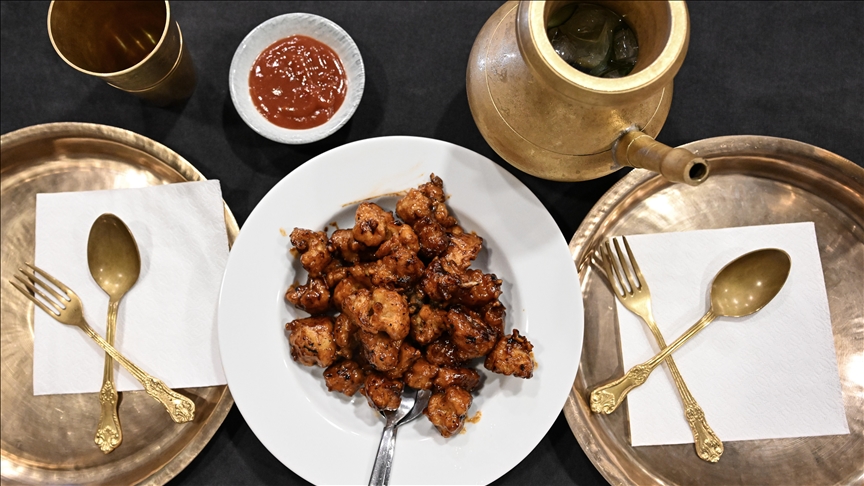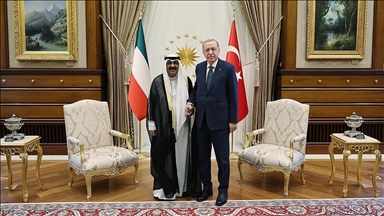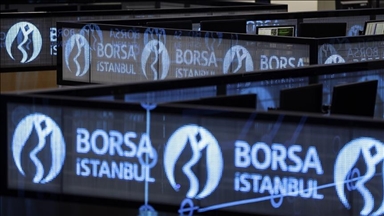Bridging cultures and people: A taste of Nepal in Istanbul
My restaurant is ‘where people from different countries, different religions, different societies and languages come together’

ISTANBUL
It is a city called home by millions from all corners of the world. It is a city synonymous with diversity, a veritable melting pot of cultures – that’s Istanbul for you.
With this comes a vibrant culinary world like no other, where one can embark on a gastronomic journey beyond any borders ever made by man – a city that’s virtually the world’s table.
Navigating this mosaic of tastes, it is not uncommon for one to stumble into the warm embrace of an unexpected world of flavor – like a charming Nepali restaurant tucked away near the city’s beating heart Taksim Square.

Among its wide variety, on offer here are chicken chili momo, a traditional Nepali stir-fry with sweet and sour flavors; the hearty “gobi,” or cauliflower, manchurian; or “daal fry,” curried lentils that are a favorite throughout the wider region.
But it is much more than the food that draws people to us, said Rajan Yonjon, the cheerful owner.
“I’m from the northeastern part of Nepal,” Yonjon, a 45-year-old native of Dharan, a city in Nepal, told Anadolu as he shared his journey from government employee to beloved restaurateur.
He came to Istanbul as a student in 2010 but the city’s beauty and the warmth of people he met made him stay.

“I went back but I returned again … Türkiye is very beautiful. Turkish people are very helpful. And Türkiye and Nepal, we share almost the same climate,” he said.
“I came here and decided to stay here, then of course I had to do something.”
Nepali cuisine, Yonjon explained, has evolved over centuries, influenced by others but set apart by its own particular blend of herbs and spices.
“Nepali cuisine was really unique throughout history. It’s influenced by Indian and Tibetan food, but we have developed our own food culture, keeping those influences,” he said.
“Nepali and Indian food are almost similar, maybe 80%, but Indian food is rich in spices. Ours has more herbs. That is the difference.”
There are similarities in Turkish and Nepali cuisines too, he said, but the difference lies in “spice, herbs and the way of preparation.”
A melting pot
With his diverse customer base, Yonjon’s restaurant is a microcosm of life in Istanbul.
“Some 30% of my customers are locals from Türkiye, some 20% Indians … and the rest from Nepal, Australia, Canada, US, from everywhere,” he said.
A lot of that popularity has to do with how he and his staff treat the customers.

“When they step inside, I’m there to reassure them that they are at the right place. I tell them whatever they pick from the menu, they will be happy,” he said.
“And when they have the first bite, I can see the happiness, the joy that my food gives them.”
There is something else that Yonjon is particularly proud of: the fact that around 20 or more of his Turkish customers have been so enamored by the food that they actually traveled to Nepal.
“This restaurant is where people from different countries, different religions, different societies and languages come together and become friends,” he said, with a beaming smile.
This is a place that is bridging gaps between people and cultures, he added.
Home away from home
For Nepali expatriates in Istanbul, Yonjon’s restaurant is that little place where they can feel a part of home.
The aroma of their own food offers comfort to those who might be feeling a bit homesick, some solace with the familiarity of flavors from their native land.
“When Nepalis from US or UK come to my restaurant, they feel like this is their home. Like they are in their country and their having their mother’s food,” he said.

Though Yonjon humbly rejects the idea of being a cultural ambassador of sorts, he does want his restaurant to be a window to Nepal and its culture.
“I want to show Nepal to the rest of the world. I want them to see and taste Nepali food. I want to show them that Nepali people are also nice and what Nepali culture is all about,” he said.
“And, of course, I want to be a part of Istanbul.”
In a city where all sorts of cultures are thriving, Yonjon’s restaurant stands as a testament to the idea of food being a universal language, bringing people from all walks of life around a table of shared flavors and stories.
It is also a reminder of the power of food and cuisines; how they can be a source of the most coveted of comforts, or serve as the spark that pushes one to take a journey to another corner of the world.
Anadolu Agency website contains only a portion of the news stories offered to subscribers in the AA News Broadcasting System (HAS), and in summarized form. Please contact us for subscription options.







